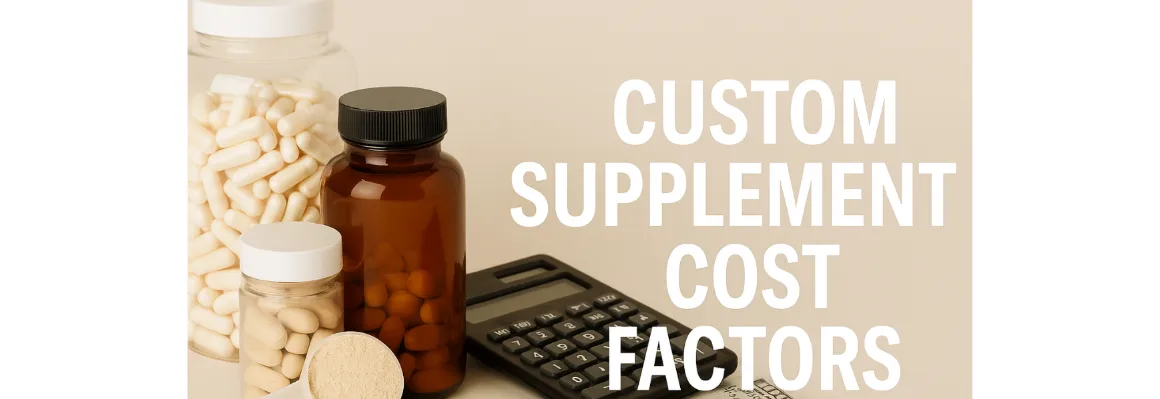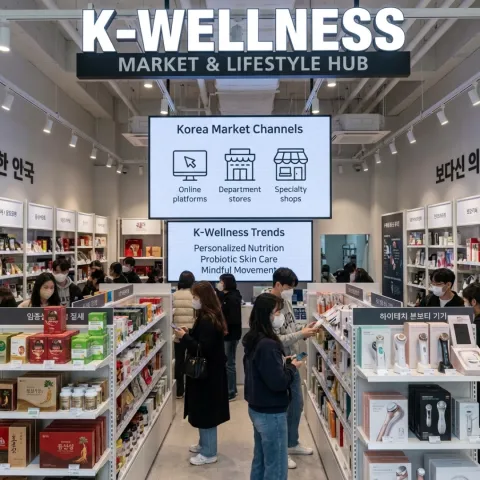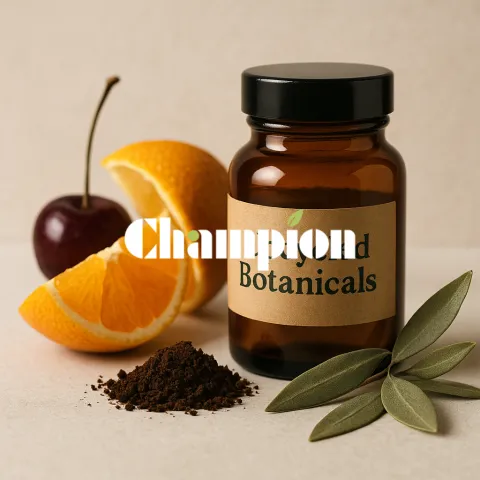Blog
21.Oct.2025
Building a Custom Supplement: Cost Factors and Success Traps

Introduction
Bringing a custom supplement from idea to shelf is a dream for wellness entrepreneurs—but it’s also an investment with unique risks. Understanding what really drives custom supplement costs is essential for success. From ingredient choices and MOQs to packaging, registration, and order scale, this guide breaks down every price driver in the 2025 supplement market, with clear, actionable insights on how to avoid the biggest cost and scaling traps.Key Cost Drivers in Custom Supplement Manufacturing
Ingredient Quality & Sourcing
- Premium, branded, or clinically-backed ingredients can cost 4–10x more than generics, but offer differentiation and higher perceived value.
- Non-GMO, organic, halal, kosher, and specialty-sourced materials increase both material and audit costs.
- Bulk buying reduces per-unit price, but exposes brands to inventory risk if the market shifts or products underperform.
Formulation and R&D Fees
- Custom formulas carry higher upfront R&D fees (typically $2,000–$10,000+ per SKU), covering formulation, stability testing, and sometimes clinical validation.
- White/private label (pre-formulated) options have lower/no R&D but don’t offer exclusivity or advanced claims.
Minimum Order Quantity (MOQ)
- Most custom manufacturers set a MOQ of 2,500–5,000 units/SKU for capsules, tablets, or powder pouches. Gummies, bars, or liquids often require even higher MOQs.
- Lower MOQs mean higher per-unit pricing:
- 2,500 units: $20,000 total ($8 per unit)
- 5,000 units: $25,000 ($5 per unit)
- 10,000 units: $30,000 ($3 per unit)lipa
- High MOQs are driven by labor, setup, and raw material supply contracts necessary to secure manufacturer margins.
Manufacturing & Production
- Direct production costs include ingredient procurement, blending/encapsulation, quality control, and packaging. Costs can range:
- Capsules/tablets: $0.20–$1.50/unit (material and labor, excluding packaging/design).
- Specialty forms (gummies, liquids): $0.50–$2.50+/unit.
- Small runs and complex packaging drive up tooling/setup costs and waste.
Packaging & Branding
- Custom bottles, eco-pouches, blisters, and premium finishes increase costs but boost shelf appeal and perceived value.
- High-quality label design: $500–$2,000+/SKU with more for multilingual or highly regulatory labels.
- Digital investments (batch QR codes, sustainability/traceability tools) are rising in importance and can mean extra fees per batch/order.
Registration, Certification, and Compliance
- Regulatory filings: $1,000–$8,000 on average (FDA, EU, APAC, Middle East) for new SKUs, plus annual renewal fees in some markets.
- Third-party certifications (e.g., organic, kosher, halal, NSF): $2,000–$10,000+ upfront, annual or per-batch audits may be required.
- Insurance and legal: $1,000–$5,000/year for product liability and business setup.
Scale Traps: Where Supplement Startups Lose Money
Underestimating MOQ and Inventory Risk
- Small brands often push for lower MOQs to reduce risk but miss out on economies of scale, forcing higher per-unit costs—limiting profit or price competitiveness.
- Overstocking or slow sell-through ties up cash and leads to expiration risk, especially in fast-moving trends.
Skimping on Formulation or Testing
- Cheaper, poorly researched formulas may not deliver promised benefits, risking negative reviews or recalls.
- Cutting QC and stability testing (especially for protein, probiotics, or functional plant-based blends) can backfire.
Packaging Mistakes
- Overly ambitious or unique packaging raises costs and complicates fulfillment or reorders.
- Not accounting for regulatory or language needs in international scaling leads to relabeling costs and delays.
Ineffective Marketing Launch
- Brands spend up to 30% of their launch budget on marketing—a necessity as entry barriers fall and competition rises.
- Failing to allocate enough for digital and retail sell-through (sampling, influencer activation, reviews) often leaves even great products stalled.
Table: Cost Breakdown—Sample Custom Brand Launch (Capsules/Tablets)
| Cost Element | Typical Range (USD) | Notes |
| Ingredient sourcing | $2,500–$20,000+ | Varies by quality, volume, blend |
| R&D/formulation | $2,000–$15,000 | More for complex blends |
| Manufacturing/setup | $3,500–$10,000 | Includes line set-up/testing |
| Packaging/labels | $2,000–$7,500 | Higher for sustainable/custom design |
| Regulatory/cert. | $1,000–$10,000+ | Market/certification dependent |
| First MOQ batch | $15,000–$30,000 (2.5k–5k units) | $3–$8/unit avg. startup batch |
| Marketing/launch | $3,000–$15,000 | Initial digital/retail push |
| Total estimate | $30,000–$75,000+ | Full custom branded launch |
Note: Large volume orders cut per-unit costs but require higher upfront investment and warehousing.
Cost Optimization Strategies
- Start Small, Scale Smart: Launch with one “hero” SKU and test core markets. Use contract manufacturing with flexible MOQ if available.
- Refine Formulas for Scale: Avoid costly, rare actives or unstable blends in your first launches. Modular formulas are easier to update and easier to scale.
- Leverage Private Label First: Use pre-formulated options to prove the market, then reinvest in exclusive R&D once volumes increase.
- Negotiate with Suppliers: Build relationships to improve pricing, payment terms, and ingredient swaps as your order volume grows.
- Plan for Multi-Market Compliance: Anticipate where you’ll expand (e.g., halal, organic, sports) and invest in certifications that cover multiple target markets up front.
- Prioritize Marketing ROI: Invest in influencer partnerships, authentic testimonials, and paid media matched to your target buyer's channel preferences.
Success Traps: What the Most Profitable Brands Do Differently
- Meticulous Cash Flow Planning: Don’t overcommit, but have contingency capital for labeling or logistical surprises.
- Batch Analytics: Monitor sell-through, expiration, and consumer feedback—reinvest only into moving SKUs.
- Regulatory Vigilance: Keep all documentation organized for audits, renewals, or sudden import/export changes.
- Partner with Proven Manufacturers: Vet OEM/contract partners on their R&D, compliance, communication, and ability to deliver at multiple scales.
- Iterative Innovation: Use pilot and micro-batch launches to test new concepts before big investments.
Frequently Asked Questions
Q: What is the minimum investment to launch a custom supplement in 2025?A: Expect $20,000–$40,000 for a startup MOQ order (2,500–5,000 units) with basic custom formulation, plus setup, packaging, and compliance costs. Advanced formulas or specialty forms like gummies/liquids push initial investment higher.
Q: How can I lower my per-unit cost?
A: Increase your order size (leveraging economies of scale), simplify packaging, source cost-effective raw materials, and renegotiate as your volume grows.
Q: What’s the risk in starting too big?
A: Slow-moving inventory, tied-up capital, warehousing/storage fees, and expiration risks—especially where supplement trends change quickly.
Q: What’s the best way to test my concept with minimal risk?
A: Partner with a contract manufacturer or private label provider offering low or flexible MOQs, launch with 1–2 key products, and validate demand online before scaling up.
Conclusion
Manufacturing a custom supplement in 2025 is more accessible than ever, but navigating cost drivers, MOQs, and scale traps requires a strategic, data-driven approach. Brands who succeed launch lean, scale smart, and prioritize compliance, quality, and marketing effectiveness at every step.Ready for your own launch?
Connect with a contract supplement manufacturing advisor to get quotes, compliance checklists, and cost-saving solutions, tailored to your target market and budget.pharmanz+12

Ready for your own launch?
Connect with a contract supplement manufacturing advisor to get quotes, compliance checklists, and cost-saving solutions, tailored to your target market and budget



















